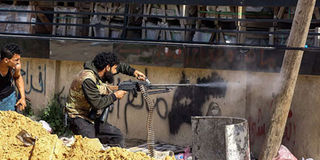Maybe Libya’s road to heaven passes through Haftar’s hell

A Libyan fighter loyal to the Government of National Accord fires a machine gun during clashes with forces loyal to strongman Khalifa Haftar south of the capital Tripoli's suburb of Ain Zara on April 10, 2019. PHOTO | MAHMUD TURKIA | AFP
What you need to know:
- Haftar is no democrat. Like all generals in Africa, he is likely to be an autocrat. But he also seems to be a nationalist.
- Haftar has taken most of Libya probably because he is seen as the man who will stitch it together.
The rest of Africa doesn’t seem to be paying much attention but there is something brewing in Libya.
After Nato bombed dictator Muammar Gaddafi’s government forces in 2011, softening him and allowing the uprising to finish him off, the revolutionaries couldn’t hold together.
They splintered into factions and militias, controlling different parts of the country.
There is now an internationally recognised administration of some sort in Tripoli comprising various militias, called the Government of National Accord (GNA).
The UN is also leading a national reconciliation process, and a conference is slated for next week, from which is hoped a peace deal to make the long-delayed elections possible.
VEHICLES
All that now seems to be in jeopardy, according to most international news outlets, threatened by a so-called “renegade general”, Khalifa Haftar.
He leads a “self-styled” Libyan National Army (LNA), allied to a rival administration in eastern Libya.
A few days ago, Haftar ordered his forces to march on Tripoli, and you have seen all the reports about Libya being likely to descend into a new civil war; a humanitarian crisis is unfolding in Tripoli and the likelihood of a bloodbath.
Why do the “international community” and media loathe Haftar? And how bad is the situation in Libya?
A few days ago, there was an interesting report that said, for all the news we hear, guns and war are not the biggest killers in Libya. It is cars.
Amidst all the chaos, Libyans have continued to buy cars like they are going out of fashion.
HAPPINESS
The country of just over six million people has about 4.5 million cars, and the mayhem on the roads is horrible with car crashes killing more people than conflict.
That might be surprising, but not as much as what the “2019 World Happiness Report”, published last month by the UN Sustainable Development Solutions Network, said about Libya.
Libya was the happiest country in Africa and the sixth-happiest in the Arab world. That might have been surprising but only to those who only took notice this year.
Many people mistake prosperity and peace for happiness, and equate adversity and conflict with misery.
They are, therefore, puzzled that Botswana, one of Africa’s most peaceful, least-corrupt and most prosperous nations, has been among the worst performers in the Happiness Index.
FREEDOM
On the other hand, since Gaddafi left, Libyans have scored highly in the Happiness Index.
It is difficult for many to come to terms with it, because those who are angry with the West for helping kick out Gaddafi don’t want to acknowledge any good out of it.
But the Libyans say, yes, the post-Gaddafi situation is terrible, but they are freer and live in less terror than when he was dictator. Human beings can be complicated.
Which all brings us back to Haftar. The chap is no democrat. Like all generals in Africa, he is likely to be an autocrat.
Human rights groups have previously reported gross violations; increasing summary execution of rivals. But he also seems to be a nationalist.
UNITED LIBYA
It is easy to miss it but Haftar and his forces now control two-thirds of Libya.
If he takes Tripoli, for the first time since the uprising against Gaddafi erupted in 2011, Libya would be close to being under a unified single authority.
Those happy Libyans could be looking for a source of national pride — a united Libya.
Haftar has taken most of Libya probably because he is seen as the man who will stitch it together. And he doesn’t have to be a nice guy who you would invite to dinner to do that.
From an African perspective, it is important to appreciate that the vacuum and chaos that followed Gaddafi’s fall would eventually create a demand for a strong figure like Haftar to fill it.
STRONGMAN
We saw it in Somalia, after years of civil war and chaos following the fall of Siad Barre.
The Islamic Courts Union (ICU), and their spin-off Al-Shabaab, rose partly as pan-Somali forces seeking to rise above clan and recreate a unified Somalia.
We were too terrified, and dismantled them. It didn’t go well.
In the early 1900s in Libya, there was a more glorious Haftar-like figure. He was called Omar Mukhtar.
Nicknamed “The Lion of the Desert”, Mukhtar was a brilliant general and great nationalist who resisted Italian colonisation of Libya.
He also fought against French colonialists in Chad and the British occupation of Egypt.
After 20 years of resistance, he was captured by the Italians in 1931 and promptly hanged.
There is a wonderful 1981 film, Lion of the Desert, starring Anthony Quinn as Mukhtar. Quinn’s performance is powerful. It was banned in Italy. However, he remains a Libyan and Arab hero.
Don’t write off Haftar yet.
Mr Onyango-Obbo is the publisher of Africapedia.com and explainer Roguechiefs.com. @cobbo3





